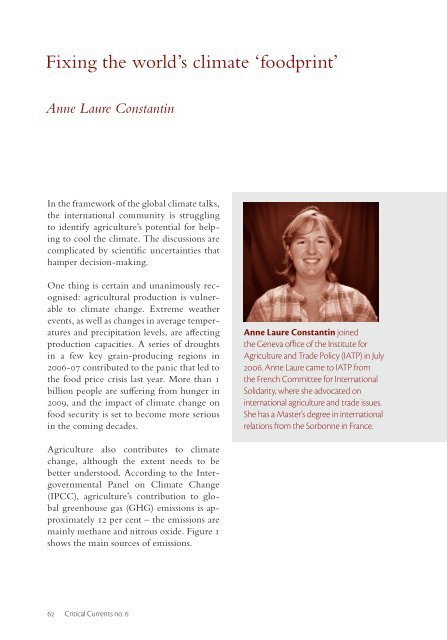Contours of Climate Justice - Dag Hammarskjöld Foundation
Contours of Climate Justice - Dag Hammarskjöld Foundation
Contours of Climate Justice - Dag Hammarskjöld Foundation
You also want an ePaper? Increase the reach of your titles
YUMPU automatically turns print PDFs into web optimized ePapers that Google loves.
Fixing the world’s climate ‘foodprint’<br />
Anne Laure Constantin<br />
In the framework <strong>of</strong> the global climate talks,<br />
the international community is struggling<br />
to identify agriculture’s potential for helping<br />
to cool the climate. The discussions are<br />
complicated by scientifi c uncertainties that<br />
hamper decision-making.<br />
One thing is certain and unanimously recognised:<br />
agricultural production is vulnerable<br />
to climate change. Extreme weather<br />
events, as well as changes in average temperatures<br />
and precipitation levels, are aff ecting<br />
production capacities. A series <strong>of</strong> droughts<br />
in a few key grain-producing regions in<br />
2006-07 contributed to the panic that led to<br />
the food price crisis last year. More than 1<br />
billion people are suff ering from hunger in<br />
2009, and the impact <strong>of</strong> climate change on<br />
food security is set to become more serious<br />
in the coming decades.<br />
Agriculture also contributes to climate<br />
change, although the extent needs to be<br />
better understood. According to the Intergovernmental<br />
Panel on <strong>Climate</strong> Change<br />
(IPCC), agriculture’s contribution to global<br />
greenhouse gas (GHG) emissions is approximately<br />
12 per cent – the emissions are<br />
mainly methane and nitrous oxide. Figure 1<br />
shows the main sources <strong>of</strong> emissions.<br />
62 Critical Currents no. 6<br />
Anne Laure Constantin joined<br />
the Geneva <strong>of</strong>fi ce <strong>of</strong> the Institute for<br />
Agriculture and Trade Policy (IATP) in July<br />
2006. Anne Laure came to IATP from<br />
the French Committee for International<br />
Solidarity, where she advocated on<br />
international agriculture and trade issues.<br />
She has a Master’s degree in international<br />
relations from the Sorbonne in France.
















